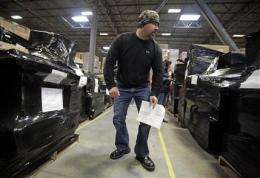Craig Slack looks over pallets of returned goods before the bidding begins at Overstock.com's warehouse, Thursday, Dec. 15, 2011, in Salt Lake City. Over 600 people registered to bid on pallets of returned items during the company's first auction of this kind. (AP Photo/Jim Urquhart)
(AP) -- Overstock.com, the online retailer known for selling distressed merchandise, was feeling a little distressed itself. With household merchandise stacking up in a warehouse, it opened the doors Thursday for an auction of goods assembled hodgepodge that had to be bought together on pallets.
Overstock was overstocked.
"We call it revenue recovery," said Carroll Morale, a vice president of supply chain, who said Overstock had already written off the mostly returned goods as a loss and was happy to get anything back.
More than 600 people registered for the warehouse auction, and many said they were bidding blindly because pallets were shrink-wrapped in black plastic and they didn't study the manifests.
"I just came to blow some money - my wife is going to kill me," said Joseph Kikel, a 34-year-old car salesman who bought a pallet of furniture for about 25 cents on the dollar.
The man from Layton, Utah, spent $350 for a leather chair, a dresser, an entertainment center and padded bench. He wasn't certain what he bought until he unloaded boxes in his pickup.
It was Overstock's first auction and to mix things up, workers stacked pallets with whatever moved down a conveyor belt - "you could get dinnerware with luggage," Morale said.
Salt Lake City auctioneer Rob Olson said 307 pallets of goods were sold for around $150,000.
"It was crazy," he said. The auction's final pallet contained $14,000 worth of women's dresses, he said. It sold for $1,800.
Normally Overstock arranges sales of unsold goods privately to other liquidators. The company called the auction a community service, and said it was able to empty part of its sprawling warehouse for expected holiday merchandise returns.
"A lot of it is furniture and decor, but one of my lots had a laptop," said Karl Fackrell, a 65-year-old real-estate developer in South Jordan, Utah.
Fackrell said he paid about $2,500 - or about 20 cents on the dollar - for six pallets of goods. "I'll sell the stuff I don't want," he said.
The auction was the latest innovation from a company whose innovations sometimes backfire.
Overstock "shot itself in the foot" earlier this year with a rebranding campaign as "O.co" that only confused consumers, said Daniel Kurnos, a stock analyst with The Benchmark Co.
Overstock was penalized earlier this year for setting up fake websites that linked to its own website, Google has said. During the two-month penalty time, Google pushed Overstock further down in search results. Overstock has said its revenue dropped 5 percent as a result.
And in California, the company's efforts to avoid charging sales tax forced it to cut ties with merchandisers who generated 5 percent of Overstock's revenue, he said.
Overstock reported a loss of $16 million for the first nine months of 2011, compared with a loss of $1 million in 2010. The company has generated profits in only two of its dozen years in business as it tries to compete in a crowded field of Internet liquidators.
"They're expecting growth for the holiday quarter, but they have to dig themselves out of a hole," Kurnos said.
Overstock says things are looking up - Cyber Monday sales after Thanksgiving weekend were the largest ever for the company. The company once aspired to take on Internet goliaths, but competitors Amazon and eBay generate sales 30 or more times greater.
On Thursday, some Utah consumers were just happy to grab a quick deal and unwrap it at home.
Others who described themselves as more serious bidders were holding onto their wallets until the end of the one-day auction, when they hoped to pick up stuff for pennies on the dollar.
Douglas Larson, a home renovator looking for furniture, was unimpressed by Overstock's emphasis on the full retail value of goods.
Nobody pays full retail, he sniffed.
"So you cut that in half right away, then cut it in half again," he said.
That was his bidding strategy, but he complained he couldn't inspect any of the shrink-wrapped boxes of goods.
©2011 The Associated Press. All rights reserved. This material may not be published, broadcast, rewritten or redistributed.




















